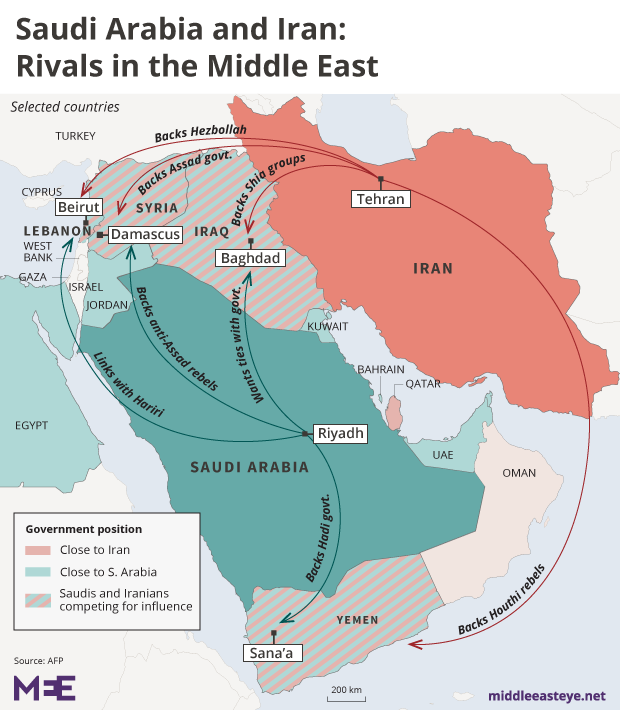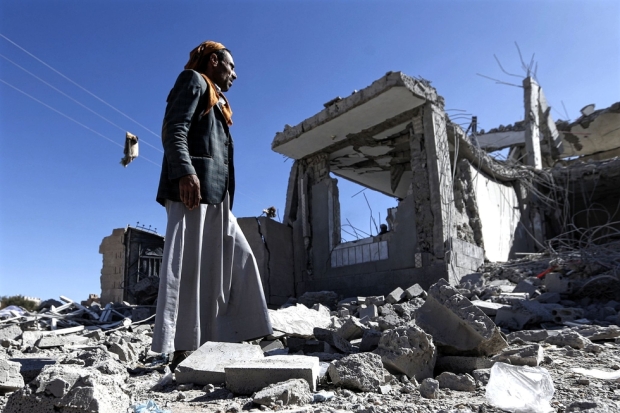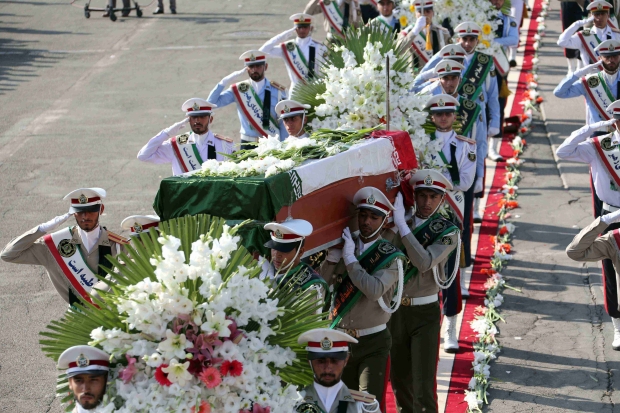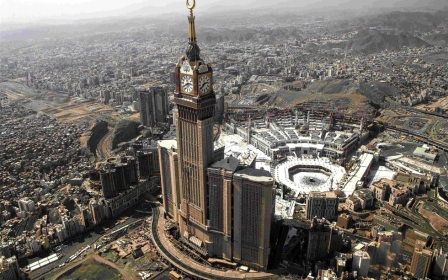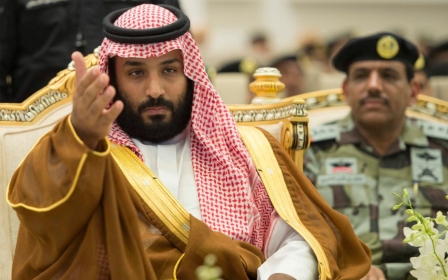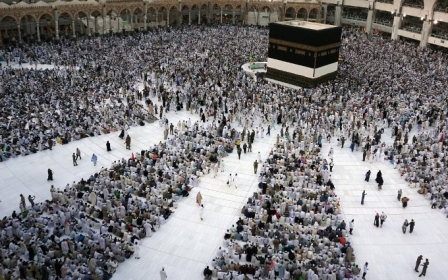Dollars and pilgrims: Iranians fear Hajj cash will fund Saudi's Yemen war
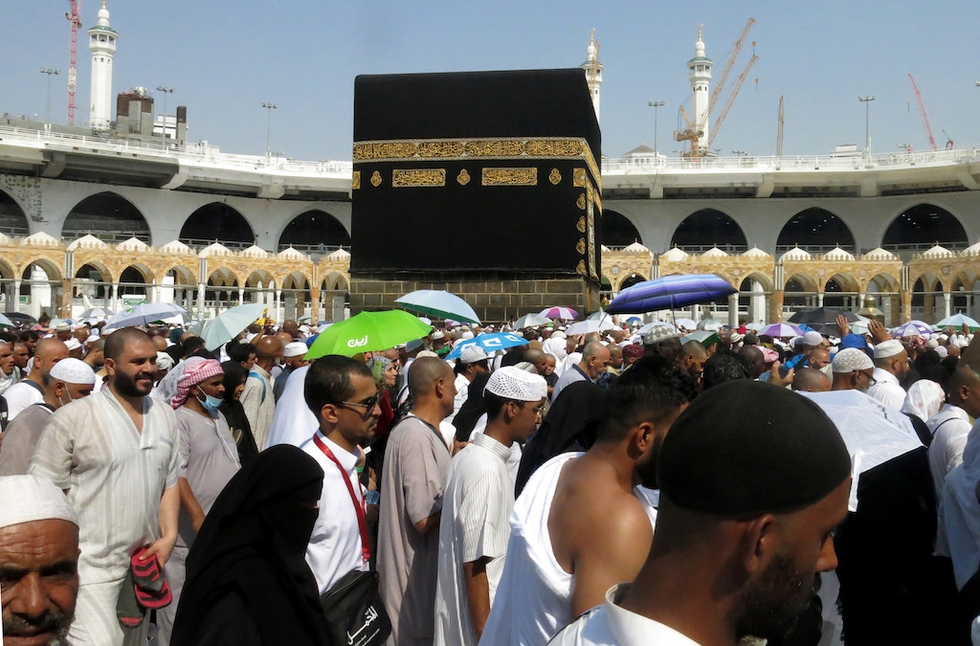
TEHRAN - Each year, Shamsedin Akhlaghi organises groups of Iranian pilgrims heading to Saudi Arabia for the Hajj.
It’s not without complications: these include organising paperwork, transporting the pilgrims to Mecca and Medina and keeping an eye on their wealth - many are elderly.
'The amount of money we carry to Mecca and Medina is nothing compared to Saudi war spending'
- Shamsedin Akhlaghi, Hajj caravan organiser
But for this year's pilgrimage, which begins on 19 August, a new factor has been thrown into the volatile mix: Iranian government plans to offer a $200 subsidy to every pilgrim.
Critics say the money, provided by the state, will ultimately trickle into the war that Riyadh is leading against rebel forces in Yemen – a war in which Tehran backs the Houthis, the group fighting the Saudi coalition.
The strength of feeling on Iranian social media is so strong that it has managed a near-impossible feat: uniting opinion between the traditional rival blocs of hardliners and reformists.
"We may have a number of problems with Saudis, but people from around the world go to Mecca to perform the Hajj,” says Shamsedin. “Our presence amid such an atmosphere can help to defeat the propaganda against us. Saudis attack Iran verbally more than Israel.
"I don’t think Iranian Hajj pilgrims' money will benefit Saudi Arabia and will be used in the war against Yemeni people. The amount of money we carry to Mecca and Medina is nothing compared to Saudi war spending."
But there are those in Iran who disagree.
How the Hajj has been backdrop to tension
For decades, the Hajj has been a sporadic flashpoint between Iran and Saudi Arabia.
First, there are the inherent differences between the republic and the kingdom: the majority of Iranians identify as Shia, while most Saudis are Sunni.
Ahmad-Reza Tondgouyan, a professor of history at Islamic Azad University, told Middle East Eye that the tensions reflect the importance of the pilgrimage.“Right now, both countries' officials hold negotiations over the Hajj annually," he says. "This is still a window of opportunity for them to get close to each other, even though other relations between the two countries have been severed since 2016."
Relations nose-dived in 1979, with the Iranian revolution and subsequent declaration of an Islamic republic. Saudi, fearing a similar uprising at home, opposed the new Iranian administration and backed Iraqi leader Saddam Hussein during the eight-year war against Tehran in the 80s.
In July 1987, Saudi police confronted Iranian pilgrims protesting against the US and Israel in Mecca. In the violence that resulted, more than 400 people were killed, including at least 275 Iranians.
Akbar Hashemi Rafsanjani, Iran's president between 1989 and 1997, succeeded in improving relations between the two states. This was built on by his successor, Mohammed Khatami, who was president from 1997 to 2005. But in 2015, more than 450 Iranian pilgrims were killed during a stampede, leading to pilgrimages being suspended again for two years.
Iranian pilgrims returned in 2017 amid reports of an easing of the rivalry between the two countries. But tensions between Riyadh and Tehran remain high as they continue to play out a Middle East Cold War in Syria, Yemen, Lebanon and elsewhere.
Economic crisis fuels anger
The number of pilgrims who can go on Hajj each year is dependent on quotas set by Saudi Arabia for each country. This year, up to 90,000 Iranians could make the pilgrimage.
On 29 June, Hajj officials in Iran said that they would subsidise pilgrims. This in itself is not unusual: the government often sells subsidised dollars to pilgrims through governmental banks.
But what has upset people this year is the rate of 39,000 rials to one American dollar – even though the dollar is being exchanged in the secondary Forex market at around 85,000 rial.
In January 2017, one American dollar was worth 32,400 rial. A year later it had risen to 36,000. It's now risen again, at the time of writing, to 43,500 at the official rate.
Earlier this year there was unrest as protesters demonstrated against corruption and the state of the economy. Some are now calling for a ban on the Hajj, saying that the subsidies – and indeed even organising pilgrimages – are distractions that the country can currently ill afford.
'People aren't happy with spending money in Saudi Arabia and benefiting its rulers'
- Masood Pouya, journalist
Critics also say that while every Muslim is expected to make the pilgrimage at some point in their life, it is only if they are financially able to do so.
Masood Pouya, a political journalist, told Middle East Eye that the Hajj will go ahead, given that a large section of Iranian society is religious, but that he opposes it.
“People aren't happy with spending money in Saudi Arabia and benefiting its rulers," he said. "This is happening while a large number of Iranian students abroad are facing problems for receiving underpriced dollars and the efforts for buying a number of medications has hit an obstacle."
Opposition is evident on social media. One user said that using the money in Saudi was an attack on the poor:
Others pointed out how Saudi had lobbied for sanctions against Iran.
Translation: "It will be written in history that Saudi Arabia lobbied for sanctions to be applied against Iran and pushed Iran towards the oil for food condition through dollars [the Saudi government] obtained from Iranian pilgrims' travel."
In Tunisia, Fadhel Ashour, a senior official in the Tunisian Union of Imams, said in June that the country's grand imam should issue an edict for boycotting the Hajj as they assumed the money is used by Saudi Arabia to "kill" Yemenis.
The comments struck a chord with some in Iran. The moderate Entekhab news site wrote on 2 July: "At least learn from Tunisia, it doesn’t want Yemen to be destroyed more as the result of its nation's presence in Hajj [ceremony]."
And prominent reformist cleric Mohammad-Ali Abtahi tweeted on July 1:
Translation: "There is no legal or religious reason for giving financial assistance to Hajj pilgrims. According to religious law, when someone has the financial ability, then he must perform the Hajj. The duty of an Islamic establishment is not providing people with financial assistance [for performing Hajj]. Those who don’t have the financial abilities, aren’t obliged to go to Hajj."
Meanwhile, hardline MP Ahmad Amirabadi Farahani, a member of the ultra-conservative party Endurance Front, said on 5 July that it was not proper to subsidise Hajj pilgrims while there were no dollar subsidies for buying medication.
Ayatollah backs the plan
But Hajj supporters are also prominent, not least among the Iranian establishment.
Ayatollah Ali Khamenei said on 16 July that keeping pilgrims away from Mecca prevented them from making the Hajj.
"Those who make this move – the government and administration which makes this grave mistake – is keeping back men from the way of God. The concepts of Hajj should be understood and acted upon."
'Hajj is a necessity of our religion and every Muslim person should perform it. This is the dream of every Muslim in Iran to go Mecca'
- Masoume Rezai, pilgrim
And Ali Ghazi-Askar, the supreme leader's representative for Hajj affairs, said on 6 July that the pilgrimage could not and would not be suspended.
Ghazi-Askar said that no one complained when 750,000 Iranian pilgrims headed for Turkey this year and added “but when it comes to 85,000 Hajj pilgrims, some people [come forward] and express their untimely protest”. Critics have pointed out that the dollar rate then was at a much lower 42,000 rials to the dollar.
Masoume Rezai, 54, who went on Hajj two years ago, said that when she went, she did not take extra money, although many did, to spend in Saudi’s bazaars.
"Hajj is a necessity of our religion and every Muslim person should perform it. This is the dream of every Muslim in Iran to go Mecca.”
This article is available in French on Middle East Eye French edition.
New MEE newsletter: Jerusalem Dispatch
Sign up to get the latest insights and analysis on Israel-Palestine, alongside Turkey Unpacked and other MEE newsletters
Middle East Eye delivers independent and unrivalled coverage and analysis of the Middle East, North Africa and beyond. To learn more about republishing this content and the associated fees, please fill out this form. More about MEE can be found here.


